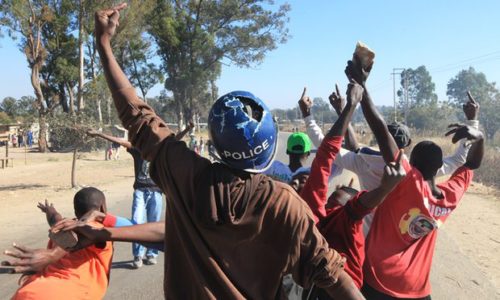
After a mass strike in Zimbabwe this week, the country’s 92-year-old president was forced to convene an emergency meeting as the nation came to a standstill.
The strike, dubbed #Zimshutdown2016 on Twitter, was not only unprecedented, but it was a rare moment of public defiance in a country that has been ruled by Robert Mugabe and his Zanu-PF party for more than 35 years.
“We are not afraid any more. We are ready to bring the dictator down,” said Promise Mkwananzi, the leader of the #Tajamuka (we have risen) movement as he addressed a press conference a day after the strike.
What started as a localised demonstration launched by unpaid government workers quickly escalated into a rallying point for national outcry against regime corruption and the worsening financial crisis.
Mugabe spoke to the country on Friday, denouncing the protests and suggesting the delay in paying salaries to civil servants was a “temporary problem” that should not have prompted teachers, doctors and nurses to go on strike.
But this isn’t an isolated event: this is the birth of a new kind of protest movement that is seriously challenging Zimbabwe’s ruling elite.
Wednesday’s strike is the latest in a continuum of public acts of defiance that first began two years ago, launched by activist and journalist Itai Dzamara, who staged an occupy protest in Harare’s central Unity Square, a stone’s throw from parliament, the constitutional court and Mugabe’s office.
But it wasn’t long before he disappeared, allegedly abducted and killed by state security agents. His whereabouts remain unknown nearly two years later.
But instead of silencing Zimbabweans, as it was supposed to, his disappearance has merely motivated others. His brother, Patson, has has been tirelessly campaigning to raise awareness of his abduction. Small scale protests were held throughout 2015, although many were met with violence by the police forces. In April, an elderly woman even heckled the president at Harare airport. Taken by surprise, the visibly angry Mugabe just about managed to contain himself and told the woman to “put her demands in writing”.
But the real shift came when protesters took their fury online. The most successful social media figure has been pastor Evan Mawarire, who created the hashtag #ThisFlag and used Facebook and Twitter to reach out to thousands of angry citizens. Evidence that online movements can be more than just clicktivism, the hashtag also was instrumental in the broad mobilisation of the strike on Wednesday.
This isn’t the first time Zimbabwe has witnessed the emergence of a protest movement, but what’s different this time is the diversity of those taking part. From bus drivers, traders, civil servants, youths, doctors, teachers and street vendors, citizens across the political spectrum are uniting.
And these dissenters include some of Mugabe’s most ardent former supporters. One group that has been at the forefront of the criticism is the influential war veterans’ association, made up of men and women who fought for liberation from British rule in the 1970s.
In the run up to the #Zimshutdown2016 protest, the veterans held a press conference to express solidarity with anti-regime dissenters. Douglas Mahiya, the association’s spokesman was reported to have said: “The entire crisis that has befallen our country is a result of poor governance and endemic corruption which is now bearing its evil fruits that are on the verge of consuming the entire fabric of Zimbabwean nationhood.” He was later allegedly forced to retract the statement by Zanu-PF.
The military is also undermining Mugabe’s quest to remain in power, ahead of the 2018 election. Speaking in April, the head of the army made it clear that he supports vice president Emmerson Mnangagwa as his preferred Zanu-PF candidate, forcing Mugabe to issue warnings against the army’s meddling in succession politics.
This coalition of the army, the vice president and the revered war veterans has kept Mugabe in charge by legitimising his power and consistently crushing dissent since the 1980s. Without their backing, his reign is more likely to be compromised.
So while peace may have returned to Harare after the successful strike on Wednesday, it is a fragile calm before an oncoming storm. All that needs to happen is for the anti-regime dissenters to join up with the disgruntled figures within the ruling class, and Mugabe’s rule will finally implode.
END

Be the first to comment